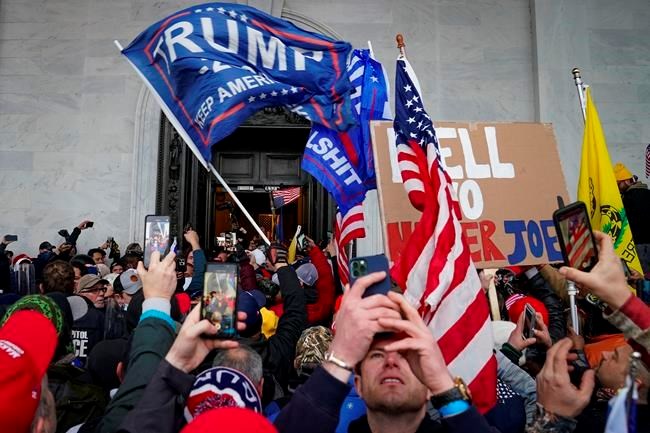WASHINGTON — Police officers who endured the Jan. 6 riots on Capitol Hill wiped away tears, pounded the witness table in anger and pleaded for justice Tuesday as they recalled a "meat grinder" of Trump-fuelled fury that nearly cost them their lives and left lasting physical and emotional scars.
Two Capitol Police officers and two from the Washington, D.C., metropolitan force stoically shared the stand as a special House committee began its long-awaited investigation into the attempted insurrection of Jan. 6.
Collectively, they told a harrowing and emotional story of fearsome violence, bitterly racist vitriol and public and political betrayal, both from being mercilessly attacked by an enraged mob of Donald Trump supporters, the same ordinary Americans they had sworn to protect, as well as partisan Republican efforts to "whitewash" the riots in the weeks and months that followed.
And they urged committee members to press on in their efforts to find out exactly what happened and bring not only the perpetrators to justice — "terrorists," two of the officers called them — but the organizers and instigators as well.
"The indifference shown to my colleagues is disgraceful," shouted D.C. police officer Michael Fanone, slamming his fist on the table for emphasis, as he described Republican efforts to thwart or play down the hearings.
"I feel like I went to hell and back to protect them and the people in this room. But too many are now telling me that hell doesn't exist, or that hell actually wasn't that bad."
Capitol Police officer Harry Dunn described how some in the crowd peppered him with racial slurs after he tried to reason with protesters by telling them that he voted for Joe Biden for president.
"That prompted a torrent of racial epithets," including the N-word, which Dunn proceeded to describe in chilling detail, adding that he later heard similar stories from other Black officers.
Capitol Police Sgt. Aquilino Gonell described, his face wet with tears, how at one point he found himself struggling to breathe under the crush of rioters trying to force their way into the building.
"I could feel myself losing oxygen and recall thinking to myself, 'This is how I'm going to die, defending this entrance,'" Gonell told the hearing.
"What we were subjected to that day was like something from a medieval battle."
Fanone repeatedly described being "tortured" and beaten unconscious by a crowd of rioters who tried to wrestle away his sidearm, all the while shouting "Get his gun" and "Kill him with his own gun."
Republican Rep. Liz Cheney — one of only two GOP members on the panel, both of them outspoken critics of Trump and his loyalists — asked Gonell how he felt about the former president's repeated claims that the crowd had been peaceful.
"I'm still recovering from those hugs and kisses," Gonell replied.
Like virtually everything that transpires in Congress these days, the hearings have been mired in the very same partisan angst that was on display on Jan. 6 and beyond.
Speaker Nancy Pelosi refused to appoint two Trump-friendly Republicans to the committee for fear of political grandstanding — a decision that prompted House Republican leader Kevin McCarthy to pull other GOP members from the panel.
Rep. Adam Kinzinger, the other Republican on the committee, briefly lost his composure as he reminded the witnesses that despite their trauma, they ultimately prevailed in defending the seat of U.S. democracy.
"You guys may, individually, feel a little broken … but you guys won, you guys held," he said, his voice breaking.
"Democracies are not defined by our bad days. We're defined by how we come back from our bad days, how we take accountability for that. And for all the overheated rhetoric surrounding this committee, our mission is very simple: it's to find the truth, and it's to ensure accountability."
At the outset, Democratic committee chairman Rep. Bennie Thompson thanked the officers for their bravery on that day as he gavelled the hearings into session.
"I can't overstate what was on the line that day: democracy," Thompson said. "You held the line."
Thompson later suggested that the committee may summon its members back to Congress for more hearings next month, before the traditional summer break is over. Cheney and Kinzinger, for their part, shrugged off the prospect of political repercussions.
"If people want to get petty, that's fine," Kinzinger said.
"This is a historic moment, this is a democracy-defending moment, no matter the consequences for me, and I know Liz will stand and defend democracy."
In their closing remarks, all four officers urged the panel forward in their search for answers, one of them likening the events of Jan. 6 to an organized hit.
"Not only does the hit man go to jail, but the person who hired him does," Dunn said.
"There was an attack carried out on Jan. 6, and a hit man sent them. I want you to get to the bottom of that."
This report by The Canadian Press was first published July 27, 2021.
James McCarten, The Canadian Press
Note to readers: This is a corrected story. An earlier version misspelled Rep. Adam Kinzinger's surname.



